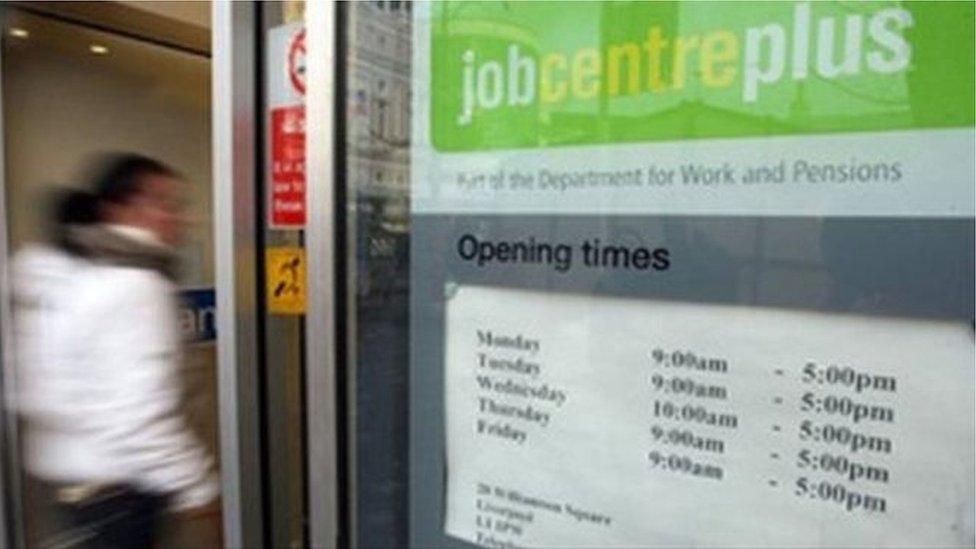People seeking work in Scotland up by 5,000
- Published

The number of people seeking work in Scotland has risen by 5,000, according to the latest employment figures.
The Office for National Statistics, external showed the total reached 120,000 in the Labour Market Survey conducted across March, April and May.
All of the rise appeared to be due to more women seeking work, while male unemployment remained the same.
The rise contrasts with a drop of 12,000 in the number seeking work across the UK as a whole.
The headline unemployment rate for Scotland was 4.3% of those aged 16 and above, while across the UK it was 4.2%.
Spring of 2017 saw the lowest recorded rate of unemployment in Scotland, at 3.8%.
The number of people in work in Scotland during May, April and May this year rose more slowly than in the rest of the UK.
Employment rose by 2,000 to 2,646,500.
The Labour Market Survey showed 137,000 more people in work across the UK, compared with the winter months.
The employment rate for Scotland - which measures those aged between 16 and 64 - stood at 75.5%, two notches below the UK rate, and 0.3 percentage points below its record level.
Over the preceding year, Scotland's employment picture was closer to strong UK figures.

More women are seeking work, while male unemployment has remained the same
The number of people in work across Scotland was up 27,000 on the spring of 2017, while it rose 338,000 across the UK.
Behind those changes were shifts in the number of people counted as "inactive" or unavailable for work.
At 21% of those aged 16 to 64, most of these are in full-time education, looking after family or in poor health.
Across the UK, the number of people in that category fell by 86,000. In Scotland, it was down by 4,000 in March to May, and by 32,000 over spring 2017.
'Young people shouldn't have to live like this'
Interpreting the figures at the Fraser of Allander Institute, economist Stuart McIntyre said the latest data reinforced recent trends of high employment and low unemployment in the Scottish economy.
Historical standards
He added: "While recent increases in unemployment, up by 0.5%-points over the past year, provides a note of caution, it is important to remember that unemployment remains, by historical standards, at a low rate.
"Looking in more detail, the data suggest that there has been something of a shift away from self-employment over the past year, with all the employment growth coming from people working as employees."
Both Scotland's employment and unemployment rate rose slightly between March and May 2018, according to new figures published today.
Andrew McRae, policy chairman of the Federation of Small Businesses' (FSB) Scotland said: "Smaller Scottish firms are now more confident about trading conditions than they have been for some time.
"Policymakers need to build on this optimism by tackling issues like the scourge of late payment and ensuring smaller firms get a fair share of public contracts.
"While everyone wants clarity about our future relationship with Europe, there's action that could be taken at home to boost growth."
The Scottish government's employment minister Jamie Hepburn said Scotland's economy and jobs market "remains strong despite the challenges facing our economy as a result of Brexit".
He added: "We are committed to growing Scotland's already strong economy with our investment-per-head on economic development dwarfing that of the UK government, while we are investing a record £2.4bn in enterprise and skills, £4bn in infrastructure and £600m in broadband and delivering the most competitive package of rates relief in the UK."
Scottish Secretary David Mundell said it was "good news" that Scotland's employment level had improved, but he said it remained below that of the rest of the UK.
He added: "I urge the Scottish government to use its powers to help more people into work and strengthen Scotland's economy. The UK government is ready to work closely and constructively with the Scottish government on this."